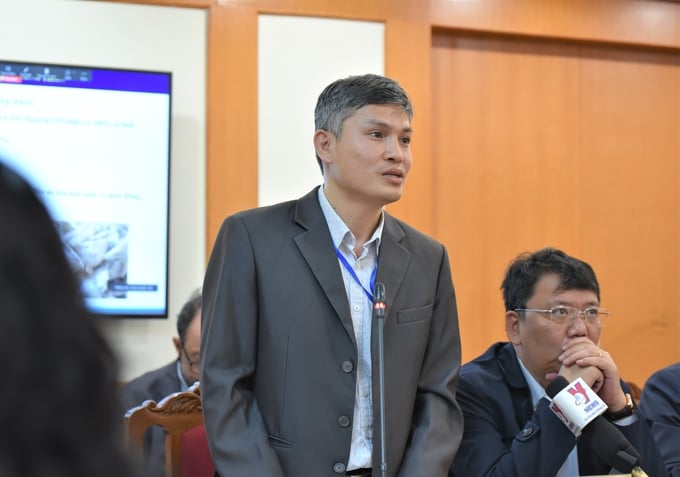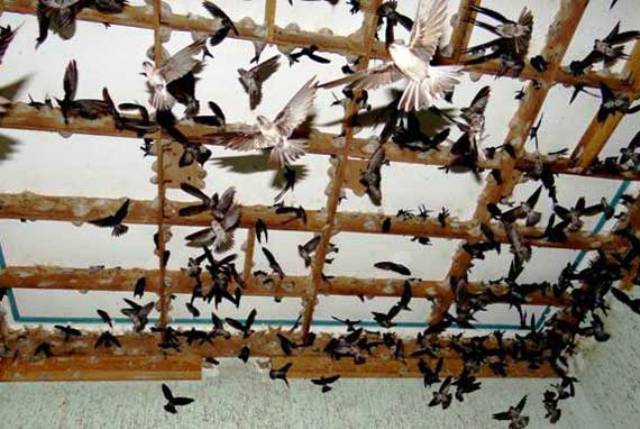November 23, 2025 | 04:57 GMT +7
November 23, 2025 | 04:57 GMT +7
Hotline: 0913.378.918
November 23, 2025 | 04:57 GMT +7
Hotline: 0913.378.918

Mr. Do Van Hoan, Department of Livestock.
At the Promoting digitalization in agro-product and food traceability forum, according to Mr. Do Van Hoan, Department of Livestock, Vietnam was reported to have over 8.3 thousand swiftlet farming houses in 2017 and by Augyut 2019, there are over 11,75 houses. There were 22.263 reported swiftlet houses in 2021 and this figure has increased to 23.665 in 2022.
Four regions in the Mekong Delta, the South East, the South Central and the Central Highlands have specialized in swiftlet farming in Vietnam. The highest being 44,67% with 10.572 houses; followed by the South East with 5965 houses, accounting for 25.21%; The South Central has 1969 houses at 8.32% and regions in the north have 201 houses, accounting for only 0.85%. Regions in the North have colder climate in the winter, which is unsuitable for swiftlet farming.
Vietnam’s current legal system for swiftlet management is relative detailed. The Law on Livestock No. 32/2018/QH14 dated November 19th 2018, regulates the management of bird’s nest farming under article 64.
Decree No. 13/2020/ND-Cp dated Janurary 21st 2020 by the Government has detailed the management of bird’s nest farming with contents including farming conditions, preliminary processing and specific regulations regardign the standards of preliminarily processed bird’s nests under Article 25 and subsequent Dispatches under the Law.

Swiftlet farming in Vietnam.
Swiftlet farming has been deemed a wide business in Vietnam, and the product has been included in the Strategy for livestock growth for the period 2021-2030, with a vision until 2045.On November 9, MARD and the General Customs of China signed the Protocol on quarantine, inspection, and veterinary hygiene standards for Vietnamese bird's nests to be transported to China.
With its extensive coastline, several islands, bays, and lagoons, Vietnam provides many favorable circumstances for swiftlet farming. The quality of Vietnam's bird's nest products is likewise deemed superior to that of other nations in the area, and Chinese buyers prefer them.
Swiftlet farming has grown rapidly in 42 provinces and cities across the country in the last five years, mostly in the South-central and Central Highlands areas, according to the ministry.Presently, over 22,000 swiftlet homes have been placed around the country, with a yearly output of over 120 tonnes valued at more than USD 500 million.
Swiftlet farming, on the other hand, has several problems. Farming is a spontaneous activity that is operated in a short-term manner. Although management of this species' growing circumstances is still insufficient. The acquisition, sale, and trading of bird's nest items has not yet had a stable market, with prices occasionally being pressured; many products are primarily exported as raw materials, therefore the value is low.
Also, epidemiological knowledge is lacking in disease control for swiftlets. Swiftlet hunting for other reasons is challenging in many areas. Absence of commodities industry connection, product origin cannot be tracked, and lack of advice while building bird nest home all have a negative impact on the quality and yield of bird's nest. Management and control of the number of swiftlets raised and product output remain challenging.

(VAN) Official Telegram No. 226/CD-TTg, issued on November 21, 2025, mandates enhanced management and utilization of national reserves to support flood response and relief efforts in the Central Region.

(VAN) The Politburo has demanded a high concentration of efforts on urgent relief tasks, ensuring absolute prevention of hunger, cold, and shortages of clean water or medicine among the population.

(VAN) Water resources during the 2025–2026 dry season in the Mekong River Basin basically meet domestic use and production needs, but localized shortages may still occur due to saltwater intrusion.

(VAN) Vietnam and Japan have committed to deepening cooperation on projects under the Joint Crediting Mechanism (JCM), improving waste management, and advancing the circular economy.

(VAN) Digital transformation is becoming a core driver of proactive, precise, and safer management of dams and reservoirs nationwide.

(VAN) This assistance supports people who temporarily relocate or evacuate, as well as communities affected by major storms from late September to now.

(VAN) Viet Nam will host the 8th ASEAN Heritage Parks Conference, bringing together over 320 delegates and reaffirming its role in regional nature conservation.